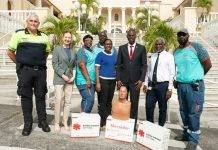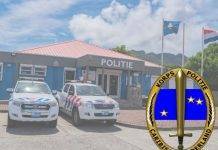I, like many others, have joined the community in collective heartbreak at losing a good man to senseless crime and I believe that, because of it, the development of Sint Maarten as a nation has just been set back immeasurably. We have been damaged as a society and our community is crying for change; change in how we manage the societal ills that face us. I would like to contribute to this very necessary discussion by establishing the link of why we should consider the environment as an important component in ensuring that the ills that we face are cured, and cured swiftly. Because we cannot have this occur again; our collective hearts cannot take it any longer.
Over the past decades St. Maarten has been faced with two issues that are increasingly eroding our national psyche, causing many of us to question what it means to be a St. Maartener and the pride that that label should bring with it. While the crime rate on our island has been taking on frightening proportions, affecting the lives and well-being of a broad spectrum of our society, our natural environmental is being degraded at an equally frightening pace.
What is interesting to note is that both the increase in crime and the decrease of our environmental quality seems to be occurring parallel to each other and we should examine what influence environmental degradation has on the increase in crime that is tarnishing our home.
It is an established fact that many factors contribute to an increase in crime: poverty, societal gaps and inadequate education just to name a few. But increasingly studies have also started to show that a society that functions within an unhealthy environment will eventually get sick and start to exhibit physical (diseases such as dengue fever and malaria) and psychological (crime, corruption, apathy) symptoms before it withers and dies.
A study released by the Scottish city of Edinburgh has shown that the steps it took to improve its environmental quality resulted in a reduction of violent crime as well as the creation of new opportunities for recreation and sustainable development jobs, providing alternatives to criminal activity. It is a sad fact that many of the criminal acts on St. Maarten are committed by individuals below thirty. When one speaks to our youth they often cite boredom, joblessness and apathy as one of the major contributing factors for committing crimes and the reality is that St. Maarten has very little in the way of opportunity.
Some years ago, while I was working in some of the poorest and most dangerous parts of Africa I was involved in a program where child soldiers were trained to become rangers and educators on marine protected areas. Many left the initiative to pursue environmental programs within their own countries, returning to enhance and develop their own communities. At the Nature Foundation we have environmental education programs where we teach our youth about environmental conservation and that, despite many people asking them what they will do with it in the future, there is work to be found in that field. These children are eager to learn and contribute to their community both in terms of the environment and in bettering their society. But many young people on our island do not have that opportunity due to the environment, both social and natural, in which they were raised and now have criminal records as thick as the bible. We try to reach out to as many as possible but we are limited by our resources and by the support that we receive.
What is more frightening, however, are the results of various studies that have shown that pollution has a direct physical affect that may cause an increase in criminal behavior. A study from the University of Lagos in Nigeria has shown that the conversion of environmentally fragile areas into urbanized zones with poor infrastructure has resulted in an increased poverty and crime rate due to pollutants that were found in the community’s drinking water and breathing air. A similar study released by NATO suggests that the human brain is being damaged by pollutants and that people exposed to certain chemicals experience an increase in anti-social and socially damaging behavior (which is what crime essentially is). A paper jointly published by the American FBI and the Environmental Protection Agency (EPA) suggests that high levels of copper, lead, and manganese, which are common pollutants found in the Philipsburg landfill, have caused the breakdown of inhibition mechanisms in the brain that can cause violent urges to be inadequately controlled. What is sad is that the people most affected by these chemicals are adolescents and pre-adolescents who, coincidentally or not, commit a majority of criminal acts on St. Maarten.
Even if one were to disregard the effects mentioned above, it is a simple fact that history, culture, lifestyle, and stages of development of a social group, society, or nation are exclusively or largely governed by the health of its environment and by the opportunities and support that it provides to its youth. Do we then, as a growing nation, want our national identity to be developed amidst the status quo? If we, as a people, continue to make ill-informed decisions regarding the protection of our Environment and the development of our Youth we cannot expect to start to begin to cure the social ills that we face. A human being simply needs fresh air, clean and clear water and sufficient green to function to his or her full potential, and we need to function to our full potential if we want to properly function as a country. What we are doing now is essentially trying to study for the most important exam of our lives sitting at a dirty and cluttered desk. We cannot focus because we are faced with so many issues that are interrelated and interconnected.
We have lost a great man and we are all saddened by his passing. But please, let all of this pain not be in vain. Let us remember our dearly beloved by changing some of the societal ills which we face, something which he did every day of his much to short life when he put on that uniform. Let us focus on involving our youth, in making them feel as if this island is theirs to conserve and protect for the generations coming after them. Let us leave this be the catalyst for a newly changed Sint Maarten.
Tadzio Bervoets
Nature Foundation St. Maarten






























